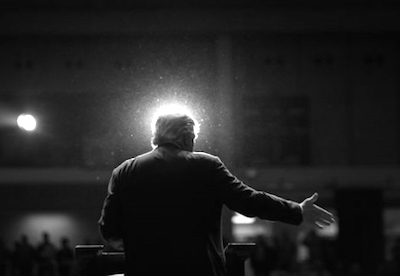 I planned my Trump novel a year ago, back when Trump was funny. It was to be the third in my Travel Writer mystery series, published by Alibi, Random House’s digital imprint for crime fiction. The premise was that my protagonist, Jacob Smalls, would be reviewing a Bahamas cruise sponsored by an outrageous rightwing dilettante tycoon who liked being on TV so much he decided to take up politics. The cruise was his way of rustling up support and money for a run for office that not even he took seriously. An unexpected crime onboard would expose him as a fraud; his supporters would be outraged to the point of mutiny. The jokes would write themselves.
I planned my Trump novel a year ago, back when Trump was funny. It was to be the third in my Travel Writer mystery series, published by Alibi, Random House’s digital imprint for crime fiction. The premise was that my protagonist, Jacob Smalls, would be reviewing a Bahamas cruise sponsored by an outrageous rightwing dilettante tycoon who liked being on TV so much he decided to take up politics. The cruise was his way of rustling up support and money for a run for office that not even he took seriously. An unexpected crime onboard would expose him as a fraud; his supporters would be outraged to the point of mutiny. The jokes would write themselves.
Ha ha.
As the real-life Presidential campaign went on, I kept having to reshape the premise. By around January of this year, it was obvious that Trump was no longer or a joke, or not just a joke, but a serious candidate. Just a few months after that, it was clear that he’d win the nomination. Trump had become a real force in American politics, and my satirical cracks at his expense were no longer funny. Obviously, I had to change the premise of my novel.
So I did. My tycoon-politician protagonist became a candidate who had just run for President and barely lost. The purpose of the cruise was no longer to drum up support, it was to rally his forces for another run at office—one that he planned to win. His new determination would inspire the crime at the novel’s heart.
When, early this summer, I wrote to my editor at Random House, Elana Seplow-Jolley, to discuss the new premise I said, “I may have rethink all of this if Trump actually becomes President, but I figure if that happens we’ll all be living in caves and fighting each other for matches and basic foodstuffs anyway.”
She replied, “Can they burn ebooks?” (As I said, Alibi is a digital imprint.)
Ha ha again.
We all know what happened next.
Amid the general disaster of Trump’s election, I’ve been faced with a minor, personal disaster — I’ve had to rethink my crime novel yet again. I’m still determined to stick with the Trumpian theme, but now I have to imagine something that my crazy rightwing dilettante tycoon would do after becoming President. No one wants to read a story about a failed Trump when the crazier true story about a triumphant Trump is in the news every day. History has so far surpassed my attempts at satire. My job as a crime writer is to get ahead of it, or at least catch up.
What happened to me is what happened to so many people, particularly liberals, and more particularly Northeastern liberals. We never dreamed Trump could ever be elected. Collectively, we suffered a massive failure of imagination.
It wasn’t just that we underestimated Trump. We misunderstood millions of Americans. Their grievances, their disdain for traditional politicians, their distrust of social institutions, their implacable hatred of Hillary Clinton — I failed to fathom all that, and I wasn’t alone. How could a Mexican-financed wall become a serious campaign promise? How could an Obama birther become President? How could so many tens of millions vote for him?
It’s not that we should have known it, but we should have imagined it. We feared a Trump victory like we fear a nightmare or a horror film. We never believed it was possible.
That’s where we failed. Some of us may want to fight Trump by marching, organizing, or contributing to political opponents. Others will want to stand up for him. But as crime writers, all of us should take up the job of imagining what will happen in the years to come — or what could happen.
I don’t mean we should turn to writing dystopian fantasies like 1984 or The Road. We should ground everything in what’s possible in the coming few years, keeping in mind that the range of the possible is far broader than we once suspected. We should ask all the questions journalists ask: What does Trump mean for crime and policing in America? What can we expect from the resurgent “white”-pride movement? And from businessmen politicians proudly doing business in office? And from the new online communities spreading lies and fomenting hate in its oldest forms?
And after we ask those questions, we should bring the answers to life in our fiction. To make the possible seem real, because it might well become real. Crime fiction depends on social insight as much as on psychology and plot. Our setting is one of our main characters, and most of us set our books in contemporary America.
Trump is no longer a joke. We all have a lot of work to do.
—Jeff Soloway
Formerly an editor and writer for Frommer’s travel guides, Jeff Soloway is now a book editor in New York City. In 2014 he won the Robert L. Fish Memorial Award from the Mystery Writers of America. His Travel Writer mystery series is published by Alibi, Random House’s imprint for digital crime fiction. The second novel in the series, The Last Descent, which takes place in the Grand Canyon, just came out in November.
Photo courtesy of AP.
